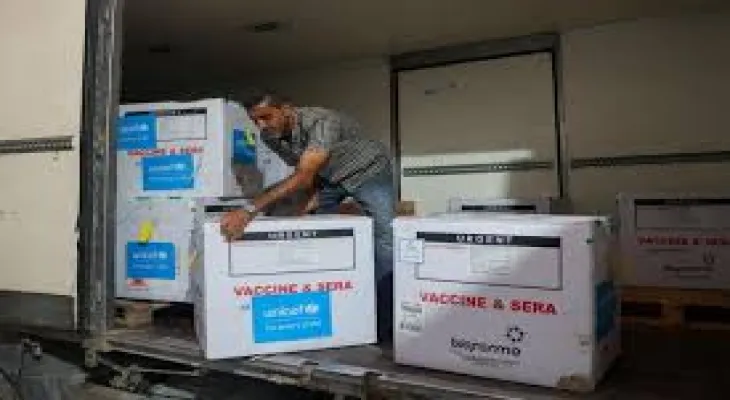Search here
Newspaper
Search here

Arab Canada News
News

Published: August 28, 2024
Currently, there is a warehouse in the center of Gaza filled with boxes of polio vaccines waiting for distribution.
1.2 million doses arrived in Deir al-Balah on Sunday through the joint efforts of the World Health Organization and the United Nations Children's Fund (UNICEF).
The plan aims to vaccinate 640,000 children in an attempt to stop the spread of the disease that has appeared in the region for the first time in over a quarter of a century.
But to make this campaign successful, relief workers say they need a ceasefire—at least for a few days.
Jonathan Kryk, a spokesperson for UNICEF based in Jerusalem, told program host Niall Coxall: "It is almost impossible to run a vaccination campaign against polio anywhere in the world if it is in a combat conflict area."
"So it is absolutely essential that some places at least, for some days, are safe—or relatively safe—so that we can operate and families can come."
Call for a "Ceasefire for Several Days"
UNICEF, the World Health Organization, and other relief organizations are calling for a series of temporary pauses in fighting—what they are calling "days of calm"—to safely distribute two rounds of polio vaccines.
Kryk stated that doing so is in everyone's interest, regardless of which side they belong to in the war.
Kryk added, "Viruses do not know borders or walls or fences." "It is a concern for every child in the region, not just for the children currently living in the Gaza Strip."
The Israeli Defense Forces deferred requests for comment to the Coordinating Unit for Government Activities in the Territories, the humanitarian unit of the Israeli army, which did not respond by the deadline.
However, Israel and Hamas indicated earlier that they would cooperate with vaccination efforts.
Kryk explained that the plan consists of distributing vaccines to 11 health clinics, as well as mobile units, while simultaneously launching a public awareness campaign.
These efforts were supposed to start on Monday, but were abruptly halted when Israel issued new evacuation orders on Sunday for Deir al-Balah.
The city located in the center of Gaza is where the United Nations operations center is located, which moved there from Rafah in the south after Israel ordered the evacuation there.
Sam Rose, a senior field director for the United Nations Relief and Works Agency for Palestine Refugees (UNRWA), told reporters: "We are being pressured into smaller areas of Gaza."
Rose added that the humanitarian area imposed by Israel in Gaza now makes up only 11% of the territory of the Strip.
He said, "But this is not 11% of livable land, services, and life."
A Strain of Polio Previously Considered Eradicated
Last week, the World Health Organization confirmed the first case of polio in Gaza in over 25 years—a case of 11-month-old Abdul Rahman Abu al-Judayan, who suffers from partial paralysis in his left lower leg.
The Gaza Ministry of Health declared a polio outbreak in July after finding the virus in sewage water.
While the residents of Gaza have historically had high vaccination rates against polio, the war has left the healthcare system in disarray, displacing over 90 percent of the population.
Rose affirmed, "In the midst of the chaos of war, around 180 new babies are born every day."
He stated, "These children are being born in different parts of the Gaza Strip. Sometimes they cannot be reached for routine basic vaccinations."
In addition, the variant currently spreading in Gaza is type 2 polio virus, which was previously considered eradicated in the area and is not part of the routine vaccination. This means that newborns are not only at risk, but also older children, and there are also terrible conditions on the ground, with overcrowding and a lack of clean water.
The war began on October 7, when Hamas, which controls the Gaza Strip, and other armed groups breached into Israel, killing about 1,200 people and taking over 200 hostages, according to Israeli figures. The Israeli brutal response resulted in the deaths of over 40,000 people in Gaza, according to the Gaza Ministry of Health, which does not differentiate between militants and civilians.
The International Court of Justice is currently investigating whether Israel's operations in Gaza constitute genocide, a charge that Israel has strongly denied.
Despite everything, Kryk says there is hope—at least in this particular battle.
UNICEF and WHO estimates suggest that if they can vaccinate between 90% and 95% of children under the age of ten, with the first dose distributed in September and a second round in October, they can effectively halt the spread of polio.
He believes that parents, despite all the difficulties they face, will be eager to vaccinate their children. Many have already lined up for the limited doses available from Palestinian health officials.
He added, "They realize that vaccinating their children is critical. Now, will all conditions be available that allow us to work? That’s what we're asking for. But only time will tell us that."
Comments